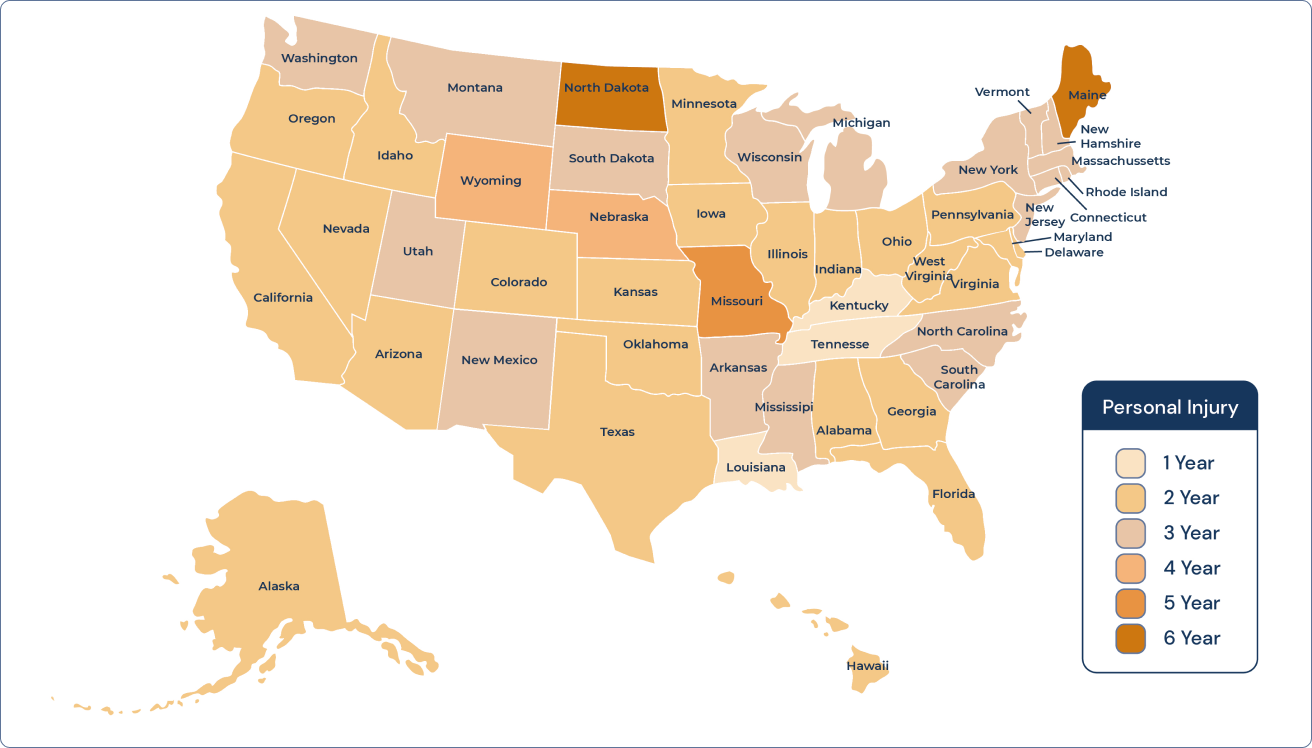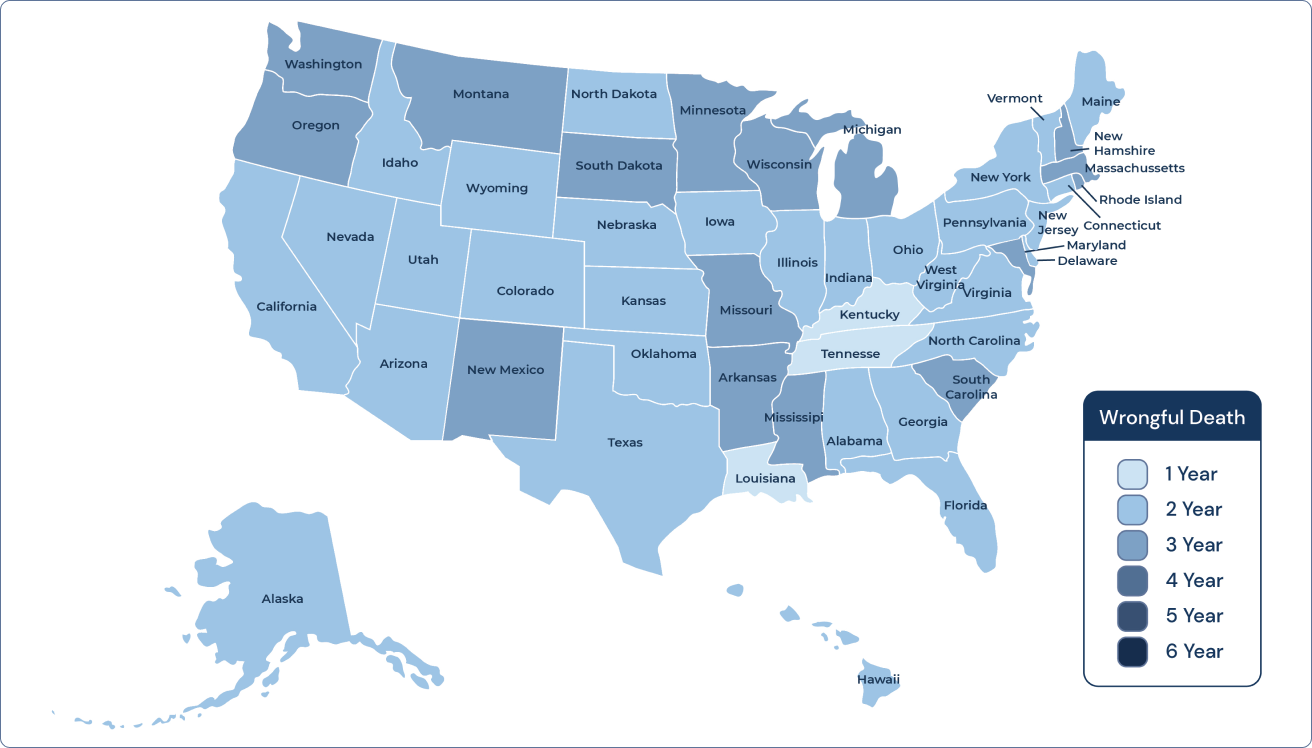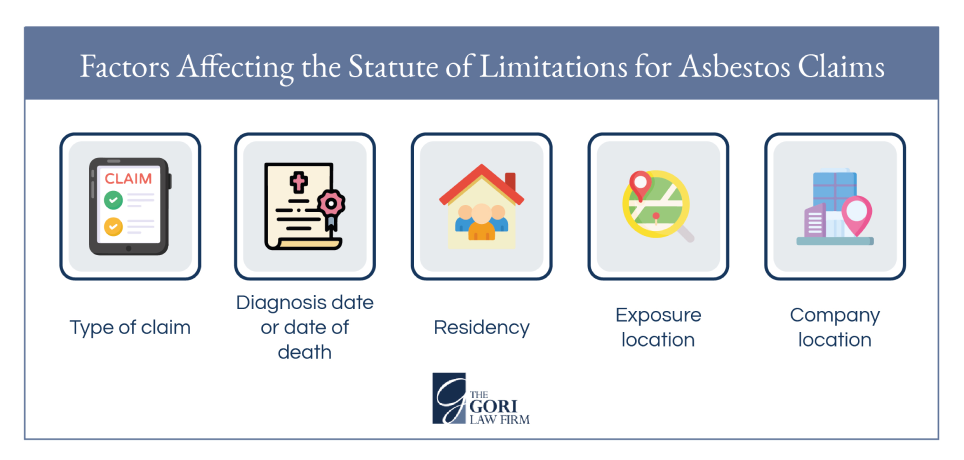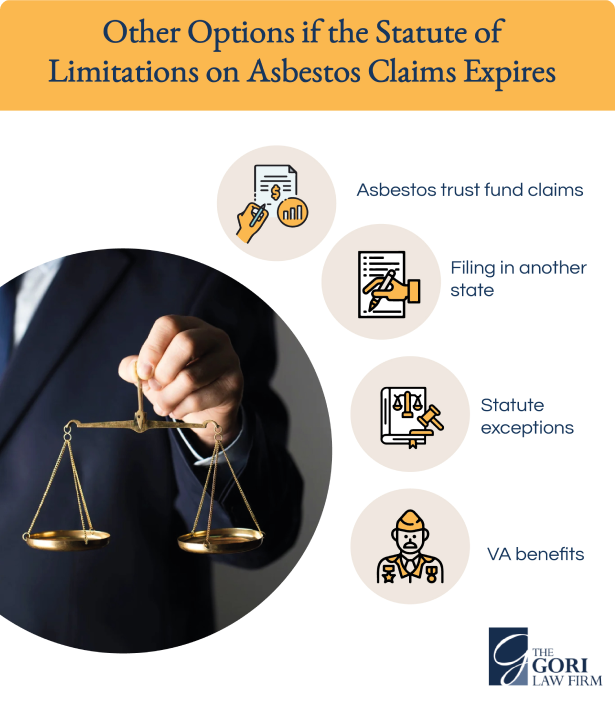Mesothelioma Statute of Limitations
Every state and asbestos trust fund has a unique time limit during which mesothelioma and asbestos-cancer victims can file claims against negligent asbestos manufacturers. This is why mesothelioma victims must file their claims as soon as possible after receiving a diagnosis to ensure they receive compensation for their suffering. If a victim misses the deadline, they will lose the opportunity to hold the companies responsible accountable for their illness.
- Because mesothelioma normally shows symptoms 20–50 years post-exposure, statutes of limitations typically start from the date of diagnosis.
- The timeframe to file a mesothelioma lawsuit varies by state, with most allowing around three years post-diagnosis but some allowing as little as one year.
- Mesothelioma victims may be able to file a personal injury, product liability, or asbestos wrongful death lawsuit, with statutes of limitations typically beginning at the date of diagnosis or date of death.
- If the statute of limitations expires in a jurisdiction, victims can explore other compensation avenues like asbestos trust fund claims, filing in another state, or seeking VA benefits if they were exposed during military service.
- The statute of limitations for asbestos claims can be affected by the type of claim, diagnosis date or date of death, state of residency, exposure location, and the location of the defendant company.
Navigate this page
- What Is a Statute of Limitations?
- How Long Do I Have to File a Mesothelioma Lawsuit?
- Factors Affecting the Statute of Limitations for Asbestos Claims
- Other Options if the Statute of Limitations on Asbestos Claims Expires
- Our Mesothelioma Lawyers Can Help File Your Claim on Time
- Mesothelioma Statute of Limitations FAQs
Navigating the legal system after a mesothelioma diagnosis can be extremely difficult, especially when you’re trying to understand filing deadlines set by statutes of limitations. Victims and families often have many questions about when they must file their legal claims.
Whether you’re a mesothelioma patient or supporting a loved one with this aggressive asbestos-related cancer, our award-winning legal team has the knowledge and experience needed to help you understand your rights. Don’t assume you’ve missed your opportunity to pursue fair compensation through the courts or other avenues. Our mesothelioma attorneys have won over $4 billion in verdicts and settlements for our clients and can help you seek justice.

Contact Us Today
Get your free case review 24 hours a day.
Fields marked with an * are required
What Is a Statute of Limitations?
Statutes of limitations establish filing deadlines to encourage timely legal action and reliable court proceedings. If you fail to file before the correct deadline set by the statute of limitations, you will lose your right to seek compensation, no matter how strong your case is.
Most statutes of limitations governing cases seeking compensation for physical harm start running on the date the injury occurred. However, mesothelioma statutes of limitations operate differently due to the nature of the disease. Mesothelioma has an extremely long latency period, often developing 20-50 years after initial exposure to asbestos.
Because mesothelioma can take so long to manifest, the “discovery rule” often applies when the filing deadline is being calculated. When this rule is applied, the statute of limitations period normally begins when the patient is diagnosed with an asbestos-related disease.
Once diagnosed, patients then have a set period to file. In other words, the discovery rule gives people suffering from mesothelioma the opportunity to file a lawsuit even if they were exposed to asbestos decades before their diagnosis.
How Long Do I Have to File a Mesothelioma Lawsuit?
Though most statutes of limitations give around three years to file, the deadline varies by state. For example, in North Dakota and Maine, victims have six years to file upon diagnosis. By contrast, victims in California, Louisiana, Kentucky, and Tennessee have only one year to file.
There are a few options for pursuing mesothelioma compensation through a lawsuit: personal injury, product liability, and wrongful death claims.
- Personal injury lawsuits – While a person with mesothelioma is still alive, they can file a personal injury claim to seek damages, such as medical costs, lost wages, and pain and suffering. The statute of limitations for personal injury mesothelioma lawsuits typically begins at the date of diagnosis.
- Product liability lawsuit – Product liability in asbestos cases involves holding manufacturers or sellers accountable for health issues caused by asbestos in their products. Victims can claim compensation for asbestos-related illnesses like mesothelioma, asserting that the company failed to warn about asbestos risks or sold products that were inherently dangerous due to asbestos content.
- Wrongful death claims – These are cases brought by or on behalf of surviving family members after the death of their loved one from mesothelioma. Wrongful death cases have statutes of limitations that start running on the date of the victim’s death rather than diagnosis, so the best time to file a wrongful death lawsuit is as soon as possible after the victim has died.
If you’re dealing with mesothelioma, knowing your legal options is essential. The time limits for filing vary based on multiple factors, including the type of claim and where the claim will be filed, so it’s crucial to act fast. Reach out to our award winning mesothelioma attorneys at The Gori Law Firm for high-quality, individualized legal guidance.


Factors Affecting the Statute of Limitations for Asbestos Claims
Each case is unique, and eligibility depends on various factors, including the laws of the state where your lawsuit is filed, the specific circumstances of your asbestos exposure, and the evidence available to support your claim. Our experienced mesothelioma attorneys can assess the viability of your case and pursue compensation on your behalf.
Pursuing compensation for mesothelioma may involve navigating different statutes of limitations depending on your unique case factors, including the following:
- Type of claim – Different filing deadlines apply to personal injury, product liability, and wrongful death claims.
- Diagnosis date or date of death – Though the time limit to file mesothelioma cases usually starts on the diagnosis date, the time limit for filing a wrongful death claim starts on the date of death.
- Residency – The state you’re domiciled in dictates the applicable filing deadline, which is typically between one and six years.
- Exposure location – Where your asbestos contact occurred affects governing laws. For example, if you were exposed to asbestos in multiple states, then multiple statutes of limitations may apply.
- Company location – The state where the defendant’s headquarters is located can also come into play when determining which state’s laws govern your case.
Contact Us Today for a Free Mesothelioma Case Review.

Other Options if the Statute of Limitations on Asbestos Claims Expires
Even if you have missed the mesothelioma statute of limitations deadline, there may still be additional compensation options to explore:
- Asbestos trust fund claims – Before going bankrupt due to the rise in asbestos-related litigation, many companies set up asbestos trust funds to compensate victims suffering from related illnesses.
- Filing in another state – If you were exposed to asbestos in more than one state, you may be able to file in a state with a longer statute of limitations.
- Statute exceptions – In some cases, a statute of limitations period can be paused or extended based on things like the plaintiff’s age or mental competency, fraud on the part of the defendant, or bankruptcy.
- VA benefits – Veterans exposed to asbestos during military service may be able to secure health, disability, and dependency benefits through the Department of Veterans Affairs (VA).

Our Mesothelioma Lawyers Can Help File Your Claim on Time
Mesothelioma is an aggressive disease, and taking timely legal action to seek compensation is essential. Though the filing deadline varies by state and, in many cases, can be quite generous, failure to file before the correct deadline passes will likely eliminate your right to pursue compensation in court.
At The Gori Law Firm, our practice focuses heavily on mesothelioma litigation and obtaining justice for those affected by asbestos-related diseases. We urge anyone battling mesothelioma or another asbestos-related disease to pursue legal compensation. Do not assume you have missed the filing deadline before consulting with an experienced mesothelioma attorney.
If you or a loved one are suffering from mesothelioma, schedule your free consultation to learn how we can help you seek the full and fair compensation you deserve.
Mesothelioma Statute of Limitations FAQs
Do I Have to File a Claim In the State That I Live In?
Not necessarily. You may be able to file in the state where exposure occurred or where the defendant company is located. An experienced asbestos exposure lawyer can determine which states you can file your lawsuit in. Our skilled attorneys are here to explain your full legal rights and options.
Are the Statute of Limitations the Same for All Asbestos-Related Illnesses?
When it comes to asbestos-related illnesses, the governing statute of limitations is normally based on the date of diagnosis but not on the specific disease itself. This is because most asbestos-related illnesses take decades to show symptoms, meaning the “discovery rule” may extend the filing deadline. Speak to an experienced mesothelioma attorney about your case to learn more about your specific filing deadline.
Do Trust Funds or VA Claims Have Time Limits?
Asbestos trust fund claims and VA claims can provide alternative sources of compensation if the statutes of limitations governing potential lawsuits have passed. Though filing deadlines vary by trust, much like statutes of limitations, they are often also based on your date of diagnosis. Further, if you develop an asbestos-related disease after military service, the VA explains as follows: “There’s no time limit on filing a postservice claim. But you should know that the process may become more complex the longer you wait.”


